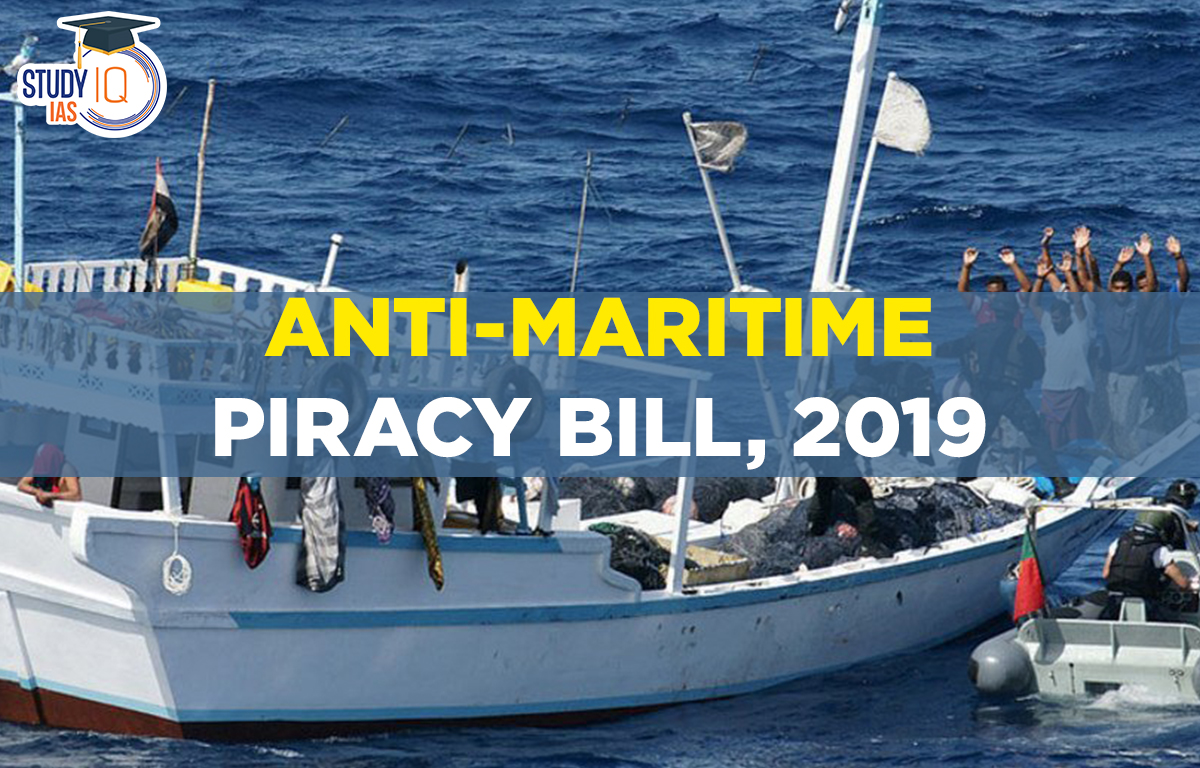Table of Contents
Piracy
- 1982 United Nations Convention on the Law of the Sea (UNCLOS) defines piracy to include any acts of violence, detention or destruction committed for private ends against persons or property on board a ship on the high seas or outside the jurisdiction of any state.
- Acts of piracy threaten maritime security by endangering the welfare of people travelling by sea and the security of navigation and commerce.
- These acts may result in the loss of life, physical harm, hostage-taking, disruptions to commerce and navigation, and financial losses to ship-owners.
- As per the International Maritime Organisation, during 2018 and 2019, 84 acts of piracy were reported globally.
Piracy Legislation in India
- Currently, India does not have a domestic legislation on maritime piracy. In the past, provisions of the Indian Penal Code, 1860 (IPC) pertaining to armed robbery and the admiralty jurisdiction of certain courts have been invoked to prosecute pirates.
- However, the sovereignty of India extends only up to the territorial waters of India (12 nautical miles from the coastline).
- Piratical acts by a foreigner committed outside the territorial waters of India do not constitute an offence under the IPC.
- For example, in the Alondra Rainbow case (1999), the Mumbai High Court acquitted the accused on grounds that India did not have the jurisdiction to prosecute them.
- In 1995, India ratified the UNCLOS, which gives a uniform international legal framework for combating acts of piracy.
- Anti-Maritime Piracy Bill, 2019 was introduced in Lok Sabha on December 9, 2019, and has been referred to the Standing Committee on External Affairs for detailed examination.
Highlights of the Bill
- Definition of Piracy: The Bill defines piracy as any illegal act of violence, detention or destruction against a ship, aircraft, person or property, for private purposes, by the crew or passengers of a private ship or aircraft. It includes-
- any illegal act of violence, detention, or destruction committed against a ship, aircraft, person or property; or
- inciting or intentionally facilitating such illegal acts; or
- voluntarily participating in the operation of a pirate ship.
- Punishment: Any person who commits an act of piracy will be punished with:
- imprisonment for life; or
- death penalty, if the act of piracy causes or attempts to cause death.
- Participating, organising, aiding, supporting, attempting to commit, and directing others to participate in an act of piracy will be punishable with up to 14 years of imprisonment, and a fine.
- Applicability: The Bill will apply to all parts of the sea adjacent to and beyond the limits of the Exclusive Economic Zone (EEZ) of India, i.e., beyond 200 nautical miles from the coastline.
- The Bill brings into law the UN Convention on the Law of the Sea. It applies to the sea beyond the Exclusive Economic Zone (EEZ), i.e., beyond 200 nautical miles from India’s coastline.
- Lacunae: Question is whether the Bill should cover the EEZ also, that is the area between 12 nautical miles and 200 nautical miles (from the coastline of India).
| Anti-Maritime Piracy Bill, 2019 | Official amendments moved by Minister (2022) | |
| Applicability of the Bill |
|
|
| Punishment for piracy | Penalty for committing any act of piracy:
|
The penalty is being amended to:
|
| Personnel authorised for arrest and seizure |
|
|
| Power to carry out arrest and seizure on grounds of suspicion |
|
|
| Jurisdiction of Designated Court | Territorial jurisdiction of designated courts will be specified by central government after consulting with the Chief Justice of India. | Adds that port or place of disembarkation within India of the person suspected or accused will be taken into account while deciding jurisdiction of the Court. |
| Definition of ship | NA | Defines ship as:
|


 Assam’s Majuli Hosts ‘Charaichung Fe...
Assam’s Majuli Hosts ‘Charaichung Fe...
 BlueBird-6 Satellite: ISRO to Launch Hea...
BlueBird-6 Satellite: ISRO to Launch Hea...
 UNEP Champions of the Earth Award: UN's ...
UNEP Champions of the Earth Award: UN's ...

























